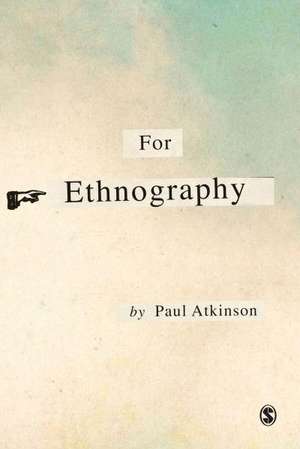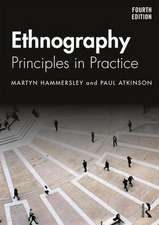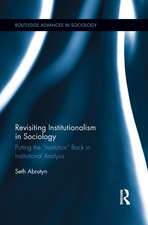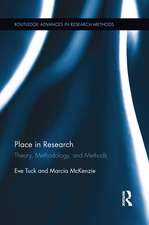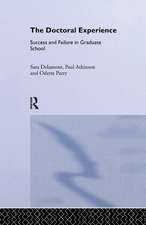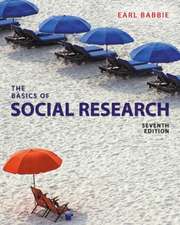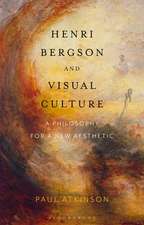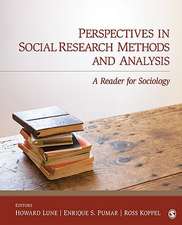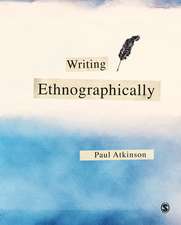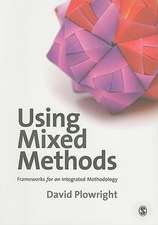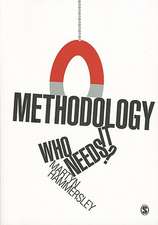For Ethnography
Autor Paul Atkinsonen Limba Engleză Paperback – 14 dec 2014
- Sam Hillyard, Durham University
This major book from one of the world’s foremost authorities recaptures the classic inspirations of ethnographic fieldwork in sociology and anthropology, reflecting on decades of methodological development and empirical research. It is part manifesto, part guidance on the appropriate focus of the ethnographic gaze.
Throughout Atkinson insists that ethnographic research must be faithful to the intrinsic and complex organization of everyday life. An attempt to rescue ethnography from contemporary ‘qualitative’ research, the book is a corrective to the corrosive effects of postmodernism on the analysis of social organization and social action. Atkinson affirms the value of fieldwork, while incorporating contemporary perspectives on social analysis.
Paul Atkinson is Distinguished Research Professor of Sociology at Cardiff University, where he is also Associate Director of the ESRC Centre for Economic and Social Aspects of Genomics.
Preț: 455.03 lei
Nou
Puncte Express: 683
Preț estimativ în valută:
87.08€ • 94.56$ • 73.15£
87.08€ • 94.56$ • 73.15£
Carte tipărită la comandă
Livrare economică 22 aprilie-06 mai
Preluare comenzi: 021 569.72.76
Specificații
ISBN-13: 9781849206082
ISBN-10: 1849206082
Pagini: 232
Dimensiuni: 156 x 234 x 18 mm
Greutate: 0.34 kg
Ediția:1
Editura: SAGE Publications
Colecția Sage Publications Ltd
Locul publicării:London, United Kingdom
ISBN-10: 1849206082
Pagini: 232
Dimensiuni: 156 x 234 x 18 mm
Greutate: 0.34 kg
Ediția:1
Editura: SAGE Publications
Colecția Sage Publications Ltd
Locul publicării:London, United Kingdom
Recenzii
This text is something of a masterclass in its own right. Few are as well placed to comment on the debates surrounding ethnography – debates which the author had been instrumental in shaping – and to offer a clear and authoritative call-to-arms to future, aspirant ethnographers. It is a passionate but realistic manifesto for those wishing to undertake the craft of ethnography and to do it well. All who read it will benefit.
Sociologist Atkinson (Cardiff Univ., UK) has written what should become a classic in the field of ethnography. For those who feel that ethnographies written over the last 20 years lack the liveliness of the great community studies of the 20th century, this book contains answers. Atkinson offers a corrective to what has become a methodological fetishism in the field, focusing more on technique than the art of understanding human communities as lived. In the spirit of C. Wright Mills’s charge to “take it big” instead of getting bogged down in the small debates of intellectual status groups, Atkinson advises readers to preserve the strength of the humanistic ethnographic tradition. He admonishes grounded theory for creating a fixation on coding and thereby disaggregating research instead of coming to know it in a more complicated way. Anthropologists should not think of themselves as the chief proprietors of ethnographic research. In a pithy chapter on ethics, Atkinson elegantly explores how ethnography is in itself a deeply ethical practice with its own built-in means of regulation, and is often traduced by review committees whose concerns are chiefly legal, not ethical or moral, and whose tradition comes out of the medical sciences, which have no affinity with the ethically attuned approach of ethnographic research.
Atkinson’s book provides both an opportunity to reflect on how to conduct high quality and detailed ethnographic research into the vagaries of work and organisational life and also a means of sharpening our thinking about the surroundings we occupy, participate in and study. For Ethnography is a must-read book for those interested in ethnographic research and a valuable chance to reflect on research practice more generally for active researchers.
Sociologist Atkinson (Cardiff Univ., UK) has written what should become a classic in the field of ethnography. For those who feel that ethnographies written over the last 20 years lack the liveliness of the great community studies of the 20th century, this book contains answers. Atkinson offers a corrective to what has become a methodological fetishism in the field, focusing more on technique than the art of understanding human communities as lived. In the spirit of C. Wright Mills’s charge to “take it big” instead of getting bogged down in the small debates of intellectual status groups, Atkinson advises readers to preserve the strength of the humanistic ethnographic tradition. He admonishes grounded theory for creating a fixation on coding and thereby disaggregating research instead of coming to know it in a more complicated way. Anthropologists should not think of themselves as the chief proprietors of ethnographic research. In a pithy chapter on ethics, Atkinson elegantly explores how ethnography is in itself a deeply ethical practice with its own built-in means of regulation, and is often traduced by review committees whose concerns are chiefly legal, not ethical or moral, and whose tradition comes out of the medical sciences, which have no affinity with the ethically attuned approach of ethnographic research.
Atkinson’s book provides both an opportunity to reflect on how to conduct high quality and detailed ethnographic research into the vagaries of work and organisational life and also a means of sharpening our thinking about the surroundings we occupy, participate in and study. For Ethnography is a must-read book for those interested in ethnographic research and a valuable chance to reflect on research practice more generally for active researchers.
Cuprins
Introduction
The Perspectives of Ethnography
Fieldwork Commitments
Analytic Perspectives
Interaction and the Ceremonial Order
Accounts and Narratives
Aesthetics, Artefacts and Techniques
Structuring Forms
Representations
The Ethics of Ethnography
Conclusion
The Perspectives of Ethnography
Fieldwork Commitments
Analytic Perspectives
Interaction and the Ceremonial Order
Accounts and Narratives
Aesthetics, Artefacts and Techniques
Structuring Forms
Representations
The Ethics of Ethnography
Conclusion
Notă biografică
Descriere
A major statement on the field from one of the world's foremost authorities on ethnography in the social sciences.
